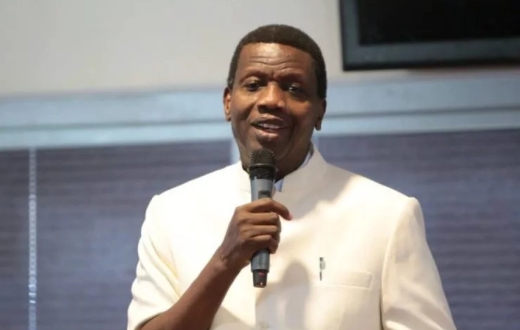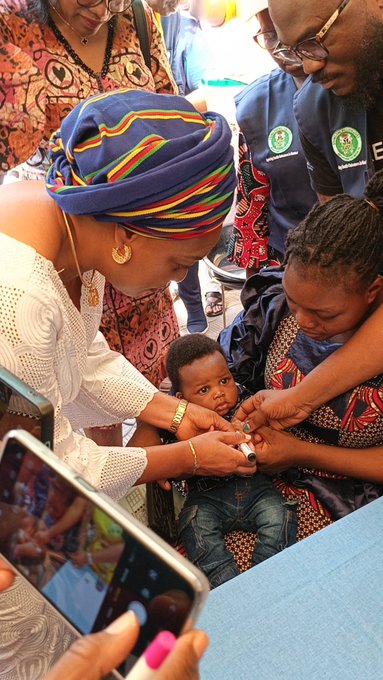Health
Omicron: Adeboye Slams Developed Nations Over Discrimination Against Africa

The General Overseer of the Redeemed Christian Church of God, Pastor Enoch Adeboye, on Thursday, took a swipe at developed nations for predicting that Africans will die of COVID-19 like chickens.
He stated this during the church’s annual Holy Ghost Congress programme which was held at the church’s headquarters along the Lagos-Ibadan Expressway.
The 79-year-old preacher, in a sermon titled, ‘The Siege Is Over’, stressed that the church must pray for the siege over Nigeria to be over and not carry placards.
He also sent a strong message to the West, saying though Africa might not have the technology and health infrastructure like developed nations, the black continent has God.
The cleric spoke amid the outbreak of the Omicron COVID-19 variant first detected in South Africa and which has spread to over 50 countries including Nigeria.
Many countries including the United Kingdom, the United States, and European nations have since slammed travel restrictions on African countries, a move that has been widely criticised as discriminatory.
Speaking on Thursday night, Adeboye said, “The highly developed nations of the world believe that they have all the technologies, that they have all the resources, that they can take care of themselves and many of them have forgotten God and then an enemy shows up, an enemy that they cannot see; an enemy that before you know it, it has attacked you and you are already in trouble.
“And they looked at Africa, we have no resources, we have no money, the few doctors we have, have left for greener pastures and they predicted that we will be dying like chickens but they left out one parameter: parameter God, they left out that there is still a group of people, who in their helpless estate, still lift up their eyes to the hills (and) say, ‘God help us’.
“I hear they are talking now, ‘We don’t even know what is going on in Africa?’ They should know. There are still some people who can cry to God, who can say, ‘God help us!’”
READ ALSO: COVID-19 Omicron: Adeboye Reveals What God Told Him When He Prayed
American business magnate, Bill Gates, had said he was yet to understand why COVID-19 cases and fatalities still remained low in Africa.
The billionaire philanthropist had in his 2020 Year In Review Notes titled, ‘These breakthroughs will make 2021 better than 2020’, said, “One thing I’m happy to have been wrong about—at least, I hope I was wrong—is my fear that COVID-19 would run rampant in low-income countries.
“So far, this hasn’t been true. In most of sub-Saharan Africa, for example, case rates and death rates remain much lower than in the US or Europe and on par with New Zealand, which has received so much attention for its handling of the virus. The hardest-hit country on the continent is South Africa—but even there, the case rate is 40 per cent lower than in the US, and the death rate is nearly 50 per cent lower.”
Health
LASG FLags Off Polio Outbreak Response Campaign

The Lagos State Government, through the Lagos State Primary Health Care Board, has launched the 2025 Polio Outbreak Response Campaign, reaffirming its commitment to eradicating polio and safeguarding the health of its children.
The ceremony, held at the Simpson Primary Healthcare Centre, was led by the First Lady of Lagos State, Dr. (Mrs.) Claudiana Ibijoke Sanwo-Olu, represented by Mrs. Widad Jumoke Mustafa, a member of the Committee of Wives of Lagos State Officials (COWLSO).
In her address, the First Lady emphasised the state government’s proactive measures to keep Lagos polio-free, highlighting the critical importance of the campaign in preventing the debilitating effects of poliomyelitis, which can result in paralysis or death.
READ ALSO: IMPEACHMENT: Lagos Ex-Speaker, Obasa’s ‘Sins’ Revealed
The First Lady also called on parents, community leaders, and stakeholders to support the campaign by ensuring eligible children are vaccinated.
Targeting children aged 0-59 months, vaccination teams will administer the Oral Polio Vaccine (OPV) to prevent virus transmission.
Dr. Kemi Ogunyemi, the Special Adviser on Health, expressed gratitude to Lagosians for their continued cooperation in the fight against polio. While appreciating all healthcare workers and partners for their services, Mrs. Ogunyemi encouraged parents to present their children and wards for the exercise.
Also speaking, the Chairman of Lagos Mainland Local Government, Mrs. Omolola Rashidat Essien opined that Immunization is key in ensuring that children are kept safe from polio and other vaccine preventable diseases.
Dr. Abimbola Bowale, the Supervising Permanent Secretary, Lagos State Primary Health Care Board, who also spoke at the event, underscored the life-saving importance of immunization.
“All children aged 0-59 months need multiple doses of the polio vaccine to ensure full protection. Any child missed represents a potential risk for the poliovirus to spread. The vaccine is safe, effective, and crucial in keeping our communities polio-free,” he stated.
Dr. Bowale also outlined several strategies to ensure the success of the campaign, including fixed post teams stationed at primary healthcare centres and public health facilities, house-to-house visits, and a transit strategy to reach special locations such as places of worship, schools, motor parks, and other public venues.
The event concluded with Dr. (Mrs.) Claudiana Ibijoke Sanwo-Olu officially launched the campaign, marking a renewed effort to maintain Lagos State’s polio-free status.
Headline
Lagos Cholera Cases Rise To 421

The Lagos state suspected cholera cases have risen to 421.
The Commissioner for Health, Akin Abayomi disclosed this on his Instagram handle @profakinabayomi on Saturday.
“As of June 20, 2024, an additional four suspected cholera cases have been reported, as illustrated in the accompanying graph,” he wrote.
He noted that the Emergency Operations Centre in collaboration with all relevant partners is actively engaged in contact tracing, community-based surveillance, awareness campaigns, sample testing, and ensuring that confirmed cholera cases receive appropriate medical treatment.
READ ALSO: Two Suspects Arrested For Stealing Car From Mosque During Juma’at Prayer
On Friday, the commissioner confirmed 35 cases out of the 417 suspected cases and 24 deaths across 20 Local Government Areas in the state.
The cases were reported from Agege, Badagry, Ikeja, Mushin, Ajeromi-Ifelofun, Epe, Ikorodu, Ojo, Alimosho, and Eti-Osa.
Others were Kosofe, Oshodi-Isolo, Amuwo-Odofin, Ibeju-Lekki, Lagos Island, Shomolu, Apapa, Ifako-Ijaiye, Lagos mainland, and Surulere.
Cholera is a food and water-borne disease caused by ingesting the bacteria— Vibrio cholerae — in contaminated water and food. Cholera can cause severe acute watery diarrhoea, and the severe forms of the disease can kill within hours if left untreated.
In Nigeria, cholera is an endemic and seasonal disease, occurring annually mostly during the rainy season and more frequently in areas with poor sanitation.
READ ALSO: Police Arrest 28yr Old Suspected Cultists, Recover Gun In Delta Community
The World Health Organisation on Thursday announced a spike in cholera in several regions of the world, with almost 195,000 cases and over 1,900 deaths reported in 24 countries since the start of 2024.
WHO said the Eastern Mediterranean Region reported the highest number of cases, followed by the African Region, the Region of the Americas, the Southeast Asia Region, and the European Region.
The global health body, however, noted that there are no reported cases in the Western Region, according to its bulletin released on Wednesday.
It said it exhausted its global stockpile of Oral Cholera Vaccines by March but was able to exceed “the emergency target of five million doses in early June for the first time in 2024.”
Health
AUTISM: What You Need To Know

By Silver Yeibake
Autism, commonly known as Autism Spectrum Disorder (ASD), is a neurodevelopmental disorder that affects communication, social interaction, and behavior. Autism is referred to as a spectrum condition since it can manifest in a variety of symptoms and abilities. While the actual cause of autism is unknown, evidence suggests that genetic and environmental factors interact to influence its development.
The risk factors include a sibling with autism, advanced age of parents, exposure to certain air pollutants and pesticides before birth, extreme prematurity, mothers with diabetes, immune system disorders or obesity, any difficulty with delivery leading to deprivation of oxygen to the baby’s brain, fever during pregnancy, lack of certain vitamins minerals during pregnancy, and certain genetic conditions, such as Down, fragile X, and Rett syndromes.
“Risk factors can not on their own cause a disease. However, they can increase the likelihood of that disease in a person.”
It is important to know that contrary to trending claims online, there is no scientific or medical evidence that vaccines or consumption of sugar are risk factors for autism.
READ ALSO: Kidney Stones: What You Need To Know
Autism is defined by difficulties in social interaction and communication. Individuals with autism may struggle to grasp social cues, maintain eye contact, and engage in typical back-and-forth conversations. Some people may also engage in meaningless, repetitive actions, such as hand-flapping or rocking, and have strong interests in specific areas.
It is essential to remember that autism is a lifelong diagnosis, but with early intervention and adequate care, people with autism can live fulfilling lives.
Autism treatment frequently includes behavioral therapy, speech therapy, occupational therapy, and social skills training. Each individual with autism is unique, thus interventions should be tailored to meet their personal needs and strengths.
In spite of the difficulties that autism can cause, many people with autism possess unique talents and abilities. Some people may succeed in fields such as music, art, mathematics, or programming, thus it is important for society to acknowledge and honor the qualities and achievements of people with autism.
In summary, autism is a complicated and diverse disorder that affects individuals in various ways. By raising autism knowledge, understanding, and acceptance, we can build a more inclusive society in which people with autism can thrive and attain their full potential.
Dr. Yeibake, Weriwoyingipre Silver.
Senior Registrar,
Faculty Of Pediatrics,
WACP

 News3 days ago
News3 days agoFormer Delta North senator Peter Nwaoboshi Dies

 News4 days ago
News4 days agoPolice Confirm Edo Tanker Explosion, say No Casualty

 News4 days ago
News4 days agoGrassroots To Global Podium: Edo Sports Commission Marks Enabulele’s First Year In Office

 Metro3 days ago
Metro3 days agoJUST IN: Former Edo Information Commissioner Is Dead

 News5 days ago
News5 days agoEdo SSG Calls On Media To Support Govt Policies, Assures Better Welfare

 News4 days ago
News4 days agoOtuaro Tasks Media On Objective Reportage

 News4 days ago
News4 days agoOkpebholo Sympathises With Otaru, People of Auchi Over Tragic Tanker Fire Incident

 News4 days ago
News4 days agoIPF Hosts Media Conference, Seeks Protection For N’Delta Environment

 News3 days ago
News3 days ago[OPINION] Tinubu: Ade Ori Okin Befits KWAM 1, Not Awujale Crown

 News3 days ago
News3 days agoCoordinator, Edo First Lady Office, Majority Leader, Rights Lawyer, Others Bag 2025 Leadership Award




















